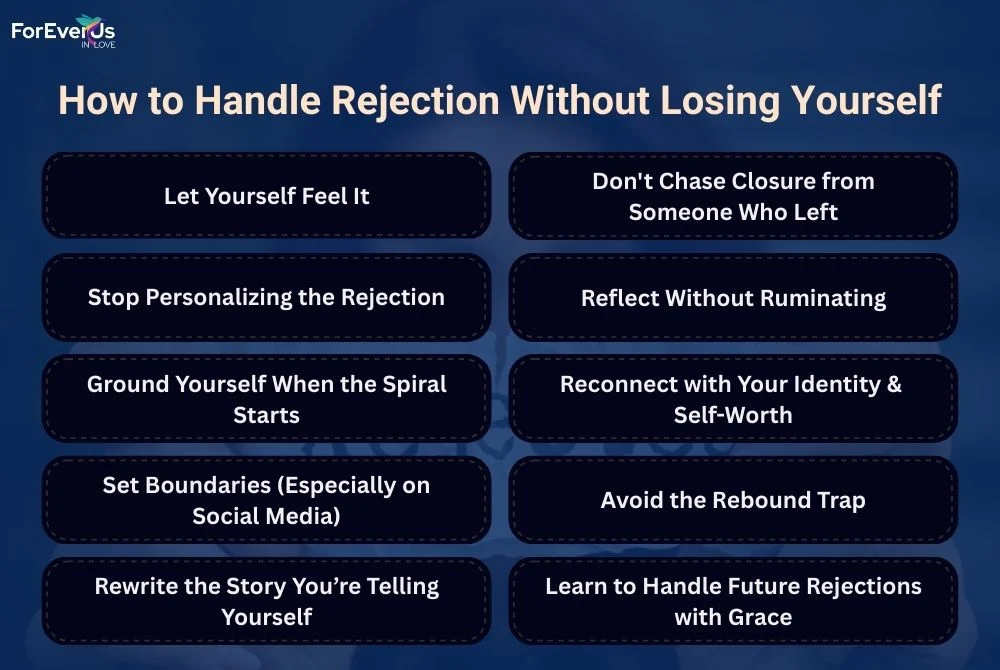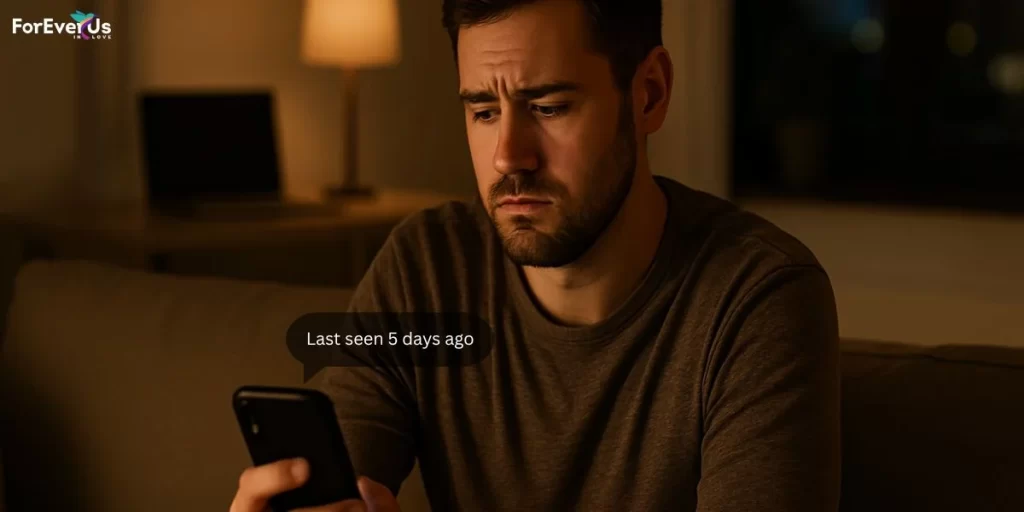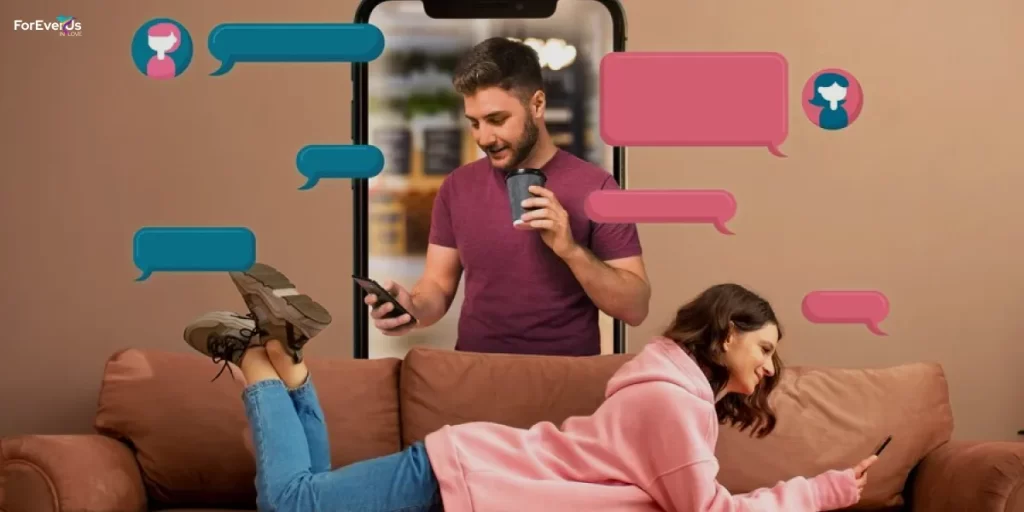Rejection hurts. Especially when it’s romantic.
Whether it’s someone you had a crush on, someone you were dating, or someone you genuinely thought had potential — being told “I’m not interested” or “This isn’t working” can feel personal, confusing, and crushing all at once.
But here’s the truth: rejection doesn’t define your worth. In fact, how you respond to it can shape your confidence, emotional intelligence, and future relationships in ways you may not realize yet.
In this guide on how to handle rejection, you’ll find practical advice, real-world examples, and insights that will help you understand romantic rejection, manage your emotions in a healthy way, and move forward with your head high. This isn’t just about feeling better — it’s about handling rejection with clarity, dignity, and emotional strength.
Why Does Rejection in Dating Feel So Painful?
Before you learn how to handle rejection, it helps to understand why it stings so much.
Rejection, especially in dating, taps into our deepest emotional wiring. We’re social beings. We crave connection, validation, and intimacy. So when someone we care about — or even someone we want to care about us — turns us away, it can feel like a threat to our self-worth.
And here’s something not everyone tells you: even a short-term crush rejecting you can trigger past emotional wounds, attachment fears, or insecurities you didn’t know were there.
That’s why it’s not “just a no.” It feels heavier. More personal.
What Not to Say to Someone Who’s Rejecting You
Rejection can catch you off guard — and in that moment, it’s tempting to blurt out things driven by shock, hurt, or pride. But what you say (or don’t say) during that moment can either protect your self-respect… or leave you with regrets.
Here’s what to avoid saying — and why:
“Why don’t you like me?”
It’s natural to want answers, but this question puts your worth on trial. Their decision isn’t a courtroom — and you don’t need to beg for clarity that may never satisfy you.
“You’ll regret this.”
This sounds defensive and bitter, even if you’re hurting. It pushes them away further and blocks any future peace — even internally.
“Was it something I did?”
Unless you’re in an ongoing, communicative relationship where feedback is shared kindly, this question often invites more pain than closure.
“I knew this would happen.”
This response pretends you’re unaffected, but it usually masks deeper hurt. It shuts down vulnerability — and with it, your chance to process honestly.
“I guess I’m just unlovable.”
Never make someone else’s “no” a reason to doubt your lovability. That belief doesn’t belong to you — it’s born in the moment of pain, not in truth.
Instead, say nothing right away — or simply say:
- “Thank you for your honesty. I’m hurt, but I respect your decision.”
That one sentence holds power, grace, and maturity — and it lets you walk away with your self-respect intact.
How to Handle Rejection Without Losing Yourself
Let’s dive into what you’re here for — how to handle rejection in a way that’s healthy, empowering, and lasting.

1. Let Yourself Feel It — It Hurts Because It Mattered
One of the worst things you can do? Pretend you’re fine when you’re not.
Letting yourself feel the sting is the first step toward healing. Rejection hurts because you cared — and caring is not a weakness.
- Cry if you need to.
- Journal your thoughts.
- Say out loud: “This hurt me.”
Grief is part of the healing process. It’s not overreacting — it’s being emotionally honest.
Tip: Label your emotions. It gives you power over them.
“I feel disappointed.” “I feel unwanted.” Naming the feeling creates space between you and the pain.
2. Stop Personalizing the Rejection
This one’s huge.
Most people, after being rejected, spiral into thoughts like:
- “What’s wrong with me?”
- “Why wasn’t I enough?”
- “What did I do to mess this up?”
- “If I were more attractive/funny/smart, they’d have stayed.”
But rejection is not a report card on your value.
Most of the time, it’s about the other person’s emotional readiness, values, or personal preferences — not a flaw in you.
Reframe the narrative:
- Instead of thinking “I wasn’t good enough,”
- Say “We weren’t the right fit — and that’s okay.”
3. Ground Yourself When the Spiral Starts
Rejection often brings a rush of anxiety. Your brain starts racing through every interaction, wondering where it all went wrong.
To regain control, try these grounding tools:
- Box Breathing: Inhale 4 seconds → hold 4 → exhale 4 → hold 4. Repeat.
- 5-4-3-2-1 Method: Name 5 things you see, 4 you can touch, 3 you hear, 2 you smell, 1 you taste.
- Journaling Prompt: “This rejection made me feel ____, but I am still ____.”
Your nervous system needs just as much healing as your heart. Slow it down. Anchor yourself.
4. Set Boundaries (Especially on Social Media)
Checking their Instagram stories. Re-reading texts. Wondering if they’re seeing someone new.
It’s normal — but it’s not helping you heal.
Social media can keep emotional wounds open.
You don’t have to delete your ex’s existence — but you do need space to heal.
Do this instead:
- Mute or unfollow them (at least temporarily).
- Archive the chats instead of re-reading them.
- Stop checking if they’ve moved on.
Protect your peace before you try to process their actions, Because Peace starts where digital access ends.
5. Rewrite the Story You’re Telling Yourself
Your mind wants to make meaning out of rejection.
But what if the story it’s telling you… isn’t true?
Instead of this:
- “I’m always the one who cares more.”
- “No one ever stays.”
Tell yourself:
- “I’m someone who shows up with honesty.”
- “I’m learning to protect my heart and keep it open.”
You’re not a failure because someone didn’t choose you.
You’re a human learning how to love in a messy, modern world.
6. Don't Chase Closure from Someone Who Left
It’s tempting to reach out for “one last conversation,” hoping for clarity, validation, or an explanation.
But here’s the truth:
Most closure doesn’t come from the other person. It comes from you.
Create your own closure:
- Write a letter you’ll never send.
- Reflect on what the relationship taught you.
- Remind yourself why it ended, not why you wanted it to continue.
Chasing answers rarely brings peace — but choosing peace does.
7. Reflect Without Ruminating
There’s a fine line between learning and obsessing.
Reflection sounds like:
- “What red flags did I ignore?”
- “What did I learn?”
- “What will I do differently next time?”
Rumination sounds like:
- “Why did this happen to me?”
- “Why wasn’t I good enough?”
- “What if I had just done this one thing?”
Reflection moves you forward. Rumination keeps you stuck.
Spend time looking at the relationship (or interaction) objectively. Was it really the right fit? Were there red flags you overlooked? Use it as fuel for growth — not shame.
8. Reconnect with Your Identity & Self-Worth
Try to rebuild your self-worth and remember who you were before them.
Because rejection doesn’t just hurt — it disconnects you from yourself.
Here’s how to reconnect:
- Restart the hobbies you paused.
- Reconnect with old friends.
- Do something just for you this week.
- Ask yourself: “What brought me joy before them?”
This isn’t just healing — it’s remembering your wholeness.
Self-care isn’t always about bubble baths. It’s about reclaiming your identity.
9. Avoid the Rebound Trap
It’s normal to want to prove you’ve “moved on” — especially when you feel rejected. But jumping into something new without healing can backfire.
Ask yourself:
“Do I want to connect — or just distract?”
Healing before dating again isn’t being weak. It’s being wise.
Tip: You don’t need someone new to feel whole. You need you.
When you rush to fill an emotional gap, you often attract people who aren’t right for you or repeat old patterns.
10. Learn to Handle Future Rejections with Grace
Yes, rejection might happen again. But that’s not something to fear — it’s something to get better at handling.
Every rejection teaches you more about what you want, how you communicate, and how you bounce back. Over time, you’ll build resilience, not just in dating but in all relationships.
Handling rejection with grace becomes a quiet superpower.
Self-Soothing Techniques That Actually Work
You don’t need to be “strong” or “move on” overnight.
But you do need emotional first aid.
Here are 3 proven ways to self-soothe:
1. Name & Normalize
Say: “I feel rejected, and that’s okay. Most people do. I’m not broken — just hurting.”
2. Create a Rejection Playlist
Not sad breakup songs — think empowering tracks that remind you who you are.
3. Comfort Rituals
- Warm tea or a hot shower
- Walk without your phone
- Write a letter to yourself — and read it tomorrow
Common Myths About Rejection (Busted)
Hidden Truth: Sometimes Rejection Is Redirection
This is the part your heart might not want to hear — but your future self will thank you for:
Sometimes rejection is the best thing that can happen to you.
Why? Because it closes a door that wasn’t meant for you — and frees you to walk through one that is.
One day, you’ll meet someone who understands your heart without you having to beg for it. And when that happens, you’ll be grateful for the person who said no.
Because that “No” made room for the right “Yes.”
When It’s Time to Ask for Help
You don’t have to figure this out alone.
Consider talking to a therapist if:
- It’s been weeks and you can’t stop thinking about them
- You’ve lost motivation, appetite, or sleep
- You’re blaming yourself or feeling worthless
It’s okay to talk to a therapist.
You’re not overreacting. You’re being responsible with your emotional health.
Final Thoughts: You’re Still Lovable. You’re Still Enough.
Learning how to handle rejection isn’t just about getting over someone. It’s about learning how to protect your peace, preserve your confidence, and grow stronger emotionally — so the next time love shows up, you’ll be ready.
The right person won’t reject the real you. They’ll recognize your value from the start — and match it with love that feels safe, consistent, and true.
So if you’ve been rejected, know this:
You are not broken. You are not hard to love. You are not defined by one “no.”
Rejection in dating may bruise your heart, but it also clears the path to someone who will choose you — fully and freely.
So the next time you ask yourself how to handle rejection, come back to this:
- Feel it.
- Ground yourself.
- Rebuild, not just recover.
And remember: You are still worthy of love.
FAQs
How long does it usually take to heal from romantic rejection?
Healing time varies for everyone. It can take days, weeks, or even months depending on how deep the connection is and your emotional resilience. The most important thing is to give yourself permission to heal at your own pace without rushing.
Should I stay friends with someone who rejected me?
It depends on your emotional boundaries. If staying friends helps you move on without pain or false hope, it’s fine. But if it keeps you stuck or wishing they’ll change their mind, it’s healthier to take space — at least temporarily.
Why does rejection sometimes feel more painful than it should?
Romantic rejection can trigger old insecurities or attachment wounds. The pain isn’t just about the person who said “no” — it also reflects what that “no” symbolizes about your past experiences or fears.
Do I always need closure from the person who rejected me?
Not always. Most closure comes from within yourself. If a respectful conversation helps you understand without hoping to change their mind, it can be helpful. But if it risks reopening old wounds, focus on creating your own closure instead.
How can I rebuild trust after being rejected?
Trust grows slowly. Start by trusting yourself—your instincts, resilience, and worth. As you meet new people, let trust develops naturally. The right person will reflect your value, not make you question it.










